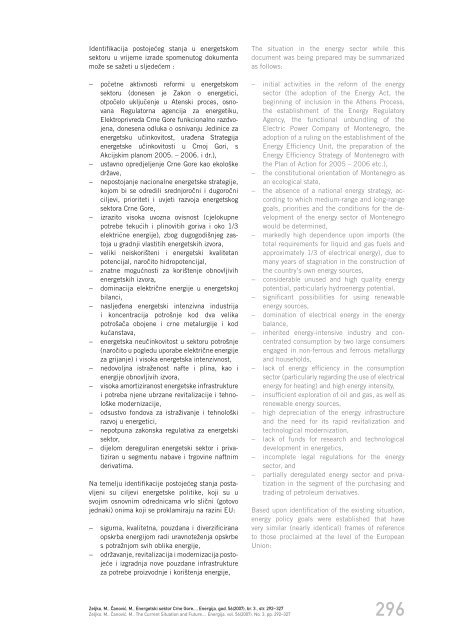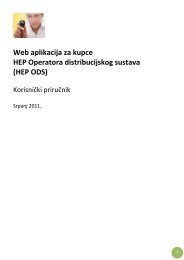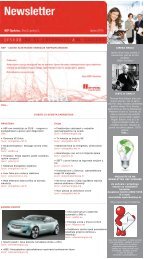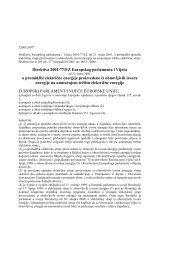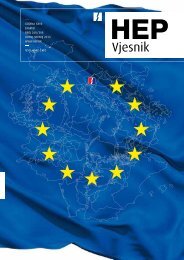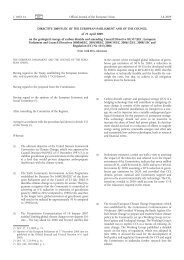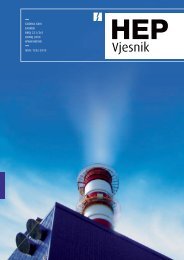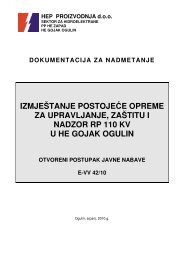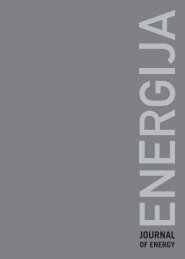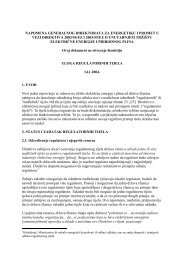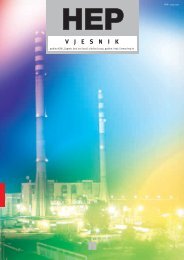Create successful ePaper yourself
Turn your PDF publications into a flip-book with our unique Google optimized e-Paper software.
Identifikacija postojeÊeg stanja u energetskom<br />
sektoru u vrijeme izrade spomenutog dokumenta<br />
moæe se saæeti u sljedeÊem :<br />
−<br />
−<br />
−<br />
−<br />
−<br />
−<br />
−<br />
−<br />
−<br />
−<br />
−<br />
−<br />
−<br />
−<br />
poËetne aktivnosti reformi u energetskom<br />
sektoru (donesen je Zakon o energetici,<br />
otpoËelo ukljuËenje u Atenski proces, osnovana<br />
Regulatorna agencija za energetiku,<br />
Elektroprivreda Crne Gore funkcionalno razdvojena,<br />
donesena odluka o osnivanju Jedinice za<br />
energetsku uËinkovitost, uraappleena Strategija<br />
energetske uËinkovitosti u Crnoj Gori, s<br />
Akcijskim planom 2005. ∑ 2006. i dr.),<br />
ustavno opredjeljenje Crne Gore kao ekoloπke<br />
dræave,<br />
nepostojanje nacionalne energetske strategije,<br />
kojom bi se odredili srednjoroËni i dugoroËni<br />
ciljevi, prioriteti i uvjeti razvoja energetskog<br />
sektora Crne Gore,<br />
izrazito visoka uvozna ovisnost (cjelokupne<br />
potrebe tekuÊih i plinovitih goriva i oko 1/3<br />
elektriËne energije), zbog dugogodiπnjeg zastoja<br />
u gradnji vlastitih energetskih izvora,<br />
veliki neiskoriπteni i energetski kvalitetan<br />
potencijal, naroËito hidropotencijal,<br />
znatne moguÊnosti za koriπtenje obnovljivih<br />
energetskih izvora,<br />
dominacija elektriËne energije u energetskoj<br />
bilanci,<br />
nasljeappleena energetski intenzivna industrija<br />
i koncentracija potroπnje kod dva velika<br />
potroπaËa obojene i crne metalurgije i kod<br />
kuÊanstava,<br />
energetska neuËinkovitost u sektoru potroπnje<br />
(naroËito u pogledu uporabe elektriËne energije<br />
za grijanje) i visoka energetska intenzivnost,<br />
nedovoljna istraæenost nafte i plina, kao i<br />
energije obnovljivih izvora,<br />
visoka amortiziranost energetske infrastrukture<br />
i potreba njene ubrzane revitalizacije i tehnoloπke<br />
modernizacije,<br />
odsustvo fondova za istraæivanje i tehnoloπki<br />
razvoj u energetici,<br />
nepotpuna zakonska regulativa za energetski<br />
sektor,<br />
dijelom dereguliran energetski sektor i privatiziran<br />
u segmentu nabave i trgovine naftnim<br />
derivatima.<br />
Na temelju identifikacije postojeÊeg stanja postavljeni<br />
su ciljevi energetske politike, koji su u<br />
svojim osnovnim odrednicama vrlo sliËni (gotovo<br />
jednaki) onima koji se proklamiraju na razini EU:<br />
−<br />
−<br />
sigurna, kvalitetna, pouzdana i diverzificirana<br />
opskrba energijom radi uravnoteæenja opskrbe<br />
s potraænjom svih oblika energije,<br />
odræavanje, revitalizacija i modernizacija postojeÊe<br />
i izgradnja nove pouzdane infrastrukture<br />
za potrebe proizvodnje i koriπtenja energije,<br />
The situation in the energy sector while this<br />
document was being prepared may be summarized<br />
as follows:<br />
−<br />
−<br />
−<br />
−<br />
−<br />
−<br />
−<br />
−<br />
−<br />
−<br />
−<br />
−<br />
−<br />
−<br />
initial activities in the reform of the energy<br />
sector (the adoption of the Energy Act, the<br />
beginning of inclusion in the Athens Process,<br />
the establishment of the Energy Regulatory<br />
Agency, the functional unbundling of the<br />
Electric Power Company of Montenegro, the<br />
adoption of a ruling on the establishment of the<br />
Energy Efficiency Unit, the preparation of the<br />
Energy Efficiency Strategy of Montenegro with<br />
the Plan of Action for 2005 ∑ 2006 etc.),<br />
the constitutional orientation of Montenegro as<br />
an ecological state,<br />
the absence of a national energy strategy, according<br />
to which medium-range and long-range<br />
goals, priorities and the conditions for the development<br />
of the energy sector of Montenegro<br />
would be determined,<br />
markedly high dependence upon imports (the<br />
total requirements for liquid and gas fuels and<br />
approximately 1/3 of electrical energy), due to<br />
many years of stagnation in the construction of<br />
the country’s own energy sources,<br />
considerable unused and high quality energy<br />
potential, particularly hydroenergy potential,<br />
significant possibilities for using renewable<br />
energy sources,<br />
domination of electrical energy in the energy<br />
balance,<br />
inherited energy-intensive industry and concentrated<br />
consumption by two large consumers<br />
engaged in non-ferrous and ferrous metallurgy<br />
and households,<br />
lack of energy efficiency in the consumption<br />
sector (particularly regarding the use of electrical<br />
energy for heating) and high energy intensity,<br />
insufficient exploration of oil and gas, as well as<br />
renewable energy sources,<br />
high depreciation of the energy infrastructure<br />
and the need for its rapid revitalization and<br />
technological modernization,<br />
lack of funds for research and technological<br />
development in energetics,<br />
incomplete legal regulations for the energy<br />
sector, and<br />
partially deregulated energy sector and privatization<br />
in the segment of the purchasing and<br />
trading of petroleum derivatives.<br />
Based upon identification of the existing situation,<br />
energy policy goals were established that have<br />
very similar (nearly identical) frames of reference<br />
to those proclaimed at the level of the European<br />
Union:<br />
Zeljko, M., »anoviÊ, M., Energetski sektor Crne Gore..., Energija, god. 56(2007), br. 3., str. 292∑327<br />
Zeljko, M., »anoviÊ, M., The Current Situation and Future..., Energija, vol. 56(2007), No. 3, pp. 292∑327<br />
296


